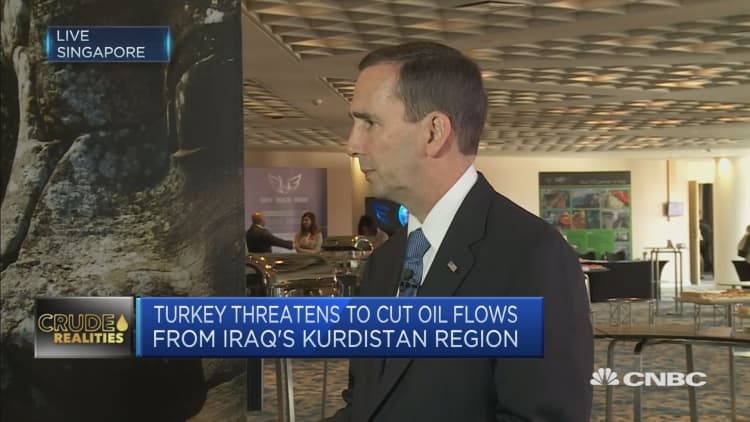Tensions over an independence vote in Iraqi Kurdistan boosted oil prices to more than two-year highs on Tuesday and could unsettle markets for weeks to come.
The semiautonomous Kurdish region in Iraq's northeast went ahead with the referendum on Monday, despite objections from the central government in Baghdad and much of the international community. The vote is non-binding, but gives Kurdish leaders a mandate to start negotiations with Iraq, a provocative step that could spark clashes and choke off oil supplies.
The move rattled not only Baghdad but the region's neighbors in Turkey and Iran, which both have large Kurdish populations. Kurds have long sought to carve out an independent state in the region.
What [the Kurds] are bracing for is either more bluster or some short-term punitive measures.Bilal WahabWashington Institute for Near East Policy fellow
Following the referendum, Turkish President Recep Tayyip Erdogan threatened to shut down a pipeline that transports about 500,000 barrels of oil per day from Iraqi Kurdistan to Ceyhan, Turkey. That daily volume is just shy of the total supply reductions that a group of oil exporters led by Russia made this year in order to help OPEC drain a global crude glut.
"The saber-rattling from Erdogan really spooked the market," said John Kilduff, founding partner at energy hedge fund Again Capital. "This is the first time we've seen oil threatened as a diplomatic weapon for a while."
prices surged 3 percent on Monday as Kurds went to the polls, hitting a 26-month high of $59.49 early on Tuesday. U.S. crude topped out at a five-month peak of $52.43. Prices fell on Tuesday as traders took profits and concern around the referendum eased, Kilduff said.
The region is likely to see a cycle of escalation before tensions ease, said Ayham Kamel, head of Middle East and North Africa practice at Eurasia Group, a risk consultancy.
Iraq oil infrastructure. Source: U.S. Energy Information Administration
The Iraqi government has asked oil traders to stop dealing with the Kurds directly and ruled out talks on a Kurdish exit. Iran closed its border and halted flights to the Kurdish region, and Turkey is threatening sanctions.
Still, all parties are wary of stoking economic crisis and ethnic violence, Kamel said.
"The most likely outcome is not going to be a permanent shutdown of the Kirkuk-Ceyhan pipeline because that would completely shut down the Kurdish economy and undermine the stability of the region, which is not a primary target of either Baghdad, Ankara or even Tehran," he said.
Iraqi Kurdistan has built positive, bilateral relations with its neighbors, so severe economic sanctions would hurt all sides, said Bilal Wahab, a fellow at the Washington Institute for Near East Policy.
Kurdish oil generates the revenue that Kurds use to buy food from Iran and Turkey, pay Turkish construction firms to develop its cities and fund trips to Istanbul by Kurdish tourists, Wahab notes. The Anglo-Turkish oil company Genel Energy is one of the biggest players in Iraqi Kurdistan.
"What [the Kurds] are bracing for is either more bluster or some short-term punitive measures," Wahab said.

Russia's growing influence in Iraqi Kurdistan could also moderate Turkey's response, according to Helima Croft, global head of commodity strategy at RBC Capital Markets. Russian oil giant Rosneft has quietly become the biggest investor in the Kurdish oil and gas industry, plowing as much as $4 billion into the region in just under a year, Reuters reported.
"It becomes a situation where it's not just taking on Barzani. It's potentially taking on Vladimir Putin," Croft told CNBC, referring to Masoud Barzani, the president of Iraqi Kurdistan.
Croft said she is more concerned about the response from Baghdad, which allocates money to Kurdistan, and the potential for violence to break out in disputed areas of the country. The Kurds have expanded their territory in northern Iraq, including cities such as the ethnically mixed Kirkuk, which they took from the so-called Islamic State.
"We are in a very polarized situation right now, and we have places like Kirkuk which have historical grievances between Kurds and Arabs. Both sides are armed," Wahab said.


